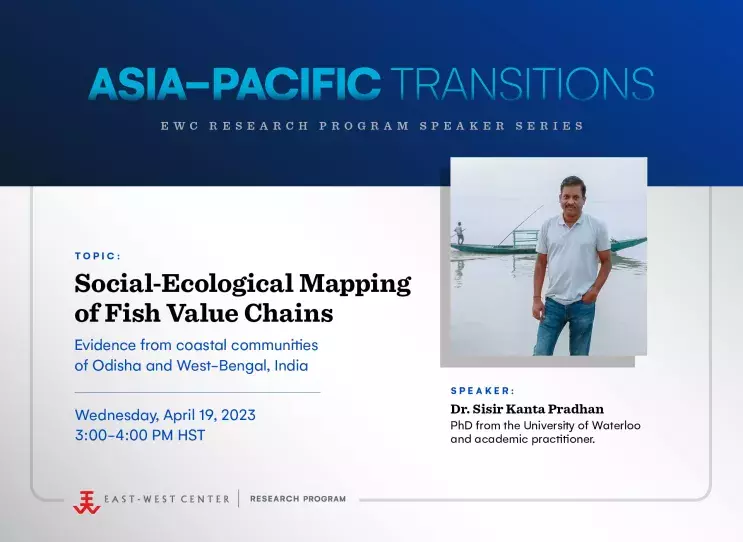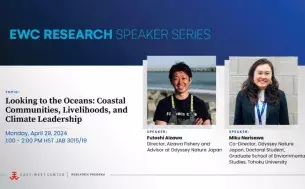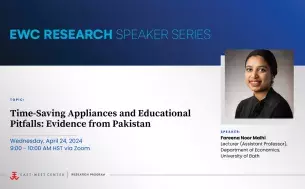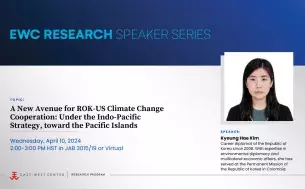Error message

OFFICE/DEPARTMENT
Asia-Pacific Transitions: EWC Research Program Speaker Series
Wednesday, April 19, 2023
3:00 - 4:00 p.m. HST
Social-Ecological Mapping of Fish Value Chains
featuring
Dr. Sisir Kanta Pradhan, PhD from the University of Waterloo and academic practitioner
The production and trade of dried fish are important sources of livelihoods and employment for poor people engaged in the dried fish value chain. More importantly, half of them are women. Dried fish makes a significant contribution to the food and nutrition security of the poor because it is high in calcium and other vital micronutrients. Despite its importance, work on the dried fish value chain (DFVC) continues to focus on financial value creation and linear interactions among market actors that impede the recognition of human rights, justice, food security, and power across the entire value chain. Such a neoclassical perspective on DFVC tends to undermine the complex human-nature interactions that are contingent upon specific histories, people, places, and practices (Pradhan et al., 2022). Poor fishers and dried fish processors placed at the extractive end of the value chain hold low power in the market and remain vulnerable to changing social-ecological system dynamics. The chapter through a mixed methods research framework, provides an empirical outlook of the dried fish value chain in relation to SES attributes in the context of the eastern Indian coast of the Bay of Bengal, including Odisha and West Bengal. The paper maps out the dried fish value chain in the case study context and provides empirical analysis of attributes of social-ecological system oriented dried fish value chain (SESDFVC). The attribute level analysis maps the social, economic, and ecological interactions, multiple non-linear feedback loops among actors and value chain nodes, offering a comprehensive understanding of place-based and actor-based issues in a disaggregated manner. SESDFVC values dynamic resource contexts, considers upstream actors as active collaborators, and expands the notion of value to include the social-ecological wellbeing of the value chain actors.
Dr. Sisir Kanta Pradhan is an academic practitioner working in sustainability management and transdisciplinary knowledge systems. He has 26 years of professional experience working with NGOs, international agencies, government UN agencies, among others. Constant search for innovations guided by whole system approach has helped to sharpen his skills of strategic engagement on development issues embedded in complex human and environment systems. Academic engagement with professional experiences in national and international development in South Asia and Africa offered him opportunities to shape development initiatives in areas of value chains, natural resource management, livelihoods, sustainable agriculture, social protection, environmental health, climate change and disaster management. He has 12 publications to his credit that include five journal articles, two edited books, two technical papers, two book chapters and one newsletter posting. He also received SSHRC and IDRC research grants and the Waterloo award for academic excellence.
The views expressed are those of the speaker and do not necessarily reflect East-West Center policies or positions.
Asia-Pacific Transitions: EWC Research Program Speaker Series
Wednesday, April 19, 2023
3:00 - 4:00 p.m. HST
Social-Ecological Mapping of Fish Value Chains
featuring
Dr. Sisir Kanta Pradhan, PhD from the University of Waterloo and academic practitioner
The production and trade of dried fish are important sources of livelihoods and employment for poor people engaged in the dried fish value chain. More importantly, half of them are women. Dried fish makes a significant contribution to the food and nutrition security of the poor because it is high in calcium and other vital micronutrients. Despite its importance, work on the dried fish value chain (DFVC) continues to focus on financial value creation and linear interactions among market actors that impede the recognition of human rights, justice, food security, and power across the entire value chain. Such a neoclassical perspective on DFVC tends to undermine the complex human-nature interactions that are contingent upon specific histories, people, places, and practices (Pradhan et al., 2022). Poor fishers and dried fish processors placed at the extractive end of the value chain hold low power in the market and remain vulnerable to changing social-ecological system dynamics. The chapter through a mixed methods research framework, provides an empirical outlook of the dried fish value chain in relation to SES attributes in the context of the eastern Indian coast of the Bay of Bengal, including Odisha and West Bengal. The paper maps out the dried fish value chain in the case study context and provides empirical analysis of attributes of social-ecological system oriented dried fish value chain (SESDFVC). The attribute level analysis maps the social, economic, and ecological interactions, multiple non-linear feedback loops among actors and value chain nodes, offering a comprehensive understanding of place-based and actor-based issues in a disaggregated manner. SESDFVC values dynamic resource contexts, considers upstream actors as active collaborators, and expands the notion of value to include the social-ecological wellbeing of the value chain actors.
Dr. Sisir Kanta Pradhan is an academic practitioner working in sustainability management and transdisciplinary knowledge systems. He has 26 years of professional experience working with NGOs, international agencies, government UN agencies, among others. Constant search for innovations guided by whole system approach has helped to sharpen his skills of strategic engagement on development issues embedded in complex human and environment systems. Academic engagement with professional experiences in national and international development in South Asia and Africa offered him opportunities to shape development initiatives in areas of value chains, natural resource management, livelihoods, sustainable agriculture, social protection, environmental health, climate change and disaster management. He has 12 publications to his credit that include five journal articles, two edited books, two technical papers, two book chapters and one newsletter posting. He also received SSHRC and IDRC research grants and the Waterloo award for academic excellence.
The views expressed are those of the speaker and do not necessarily reflect East-West Center policies or positions.








